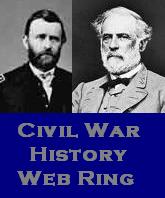As noted here and elsewhere, there’s been quite a discussion going on in the blogosphere about blogging, digital history and their relationships. Commentary can be found at Bull Runnings, Cenantua’s Blog, Draw the Sword, and others. The result has been an extremely interesting and illuminating discussion on the possible roles of blogging and digital history. It’s even spawned a wiki for further group discussion, thanks to Brian Downey. This posting is intended to address presentation format, not content.
Robert over at Cenantua’s Blog had an excellent post yesterday on formal and informal digital history. My concept of digital history at the beginning of discussion was that formal digital history is a completed work able to stand on its own that usually has its own website. A blog is an online journal, which by its very nature is an informal medium. At first blush, the two don’t appear to mix. The aforementioned Mr. Downey, for example, separates his formal work to the Antietam on the Web website, while his more informal postings appear on his blog, Behind Antietam on the Web. Both sides are great, but they're separate.
As in most cases, however, there is middle ground. Someone (I think it was Robert or Harry) recently coined the phrase “information compilation blog.” I didn’t particularly care for the title at first, but after some thought it describes my blog’s goal. Several good ones out there include Bull Runnings, Draw the Sword and To the Sound of the Guns. I hadn’t really done much comparison, but the more I looked into it, the more convinced I became that a blog is not necessarily exclusively informal. Some are intentionally informal, those that take the more traditional path of the blog as web journal. Others try to be more formal and present only “finished” pieces. Some, such as Eric’s Rantings of a Civil War Historian, do both as the mood strikes. That’s only fair, it’s the author’s blog to do with as he or she wills.
All types definitely have their place. Robert had an excellent point yesterday about the value of being able to “look over the historian’s shoulder” and get an idea of what they’re seeing and thinking through their blog as they’re writing their books. I couldn’t agree more, as such posts are some of my favorites from Eric’s blog. Others have deliberately developed this hybrid blog that is both formal and informal.
I am now convinced that an information compilation blog will be most effective as one of these hybrids. I shy away from “musts” and “shoulds,” as any author is free to do with their blog as they will, but I truly believe this is the most effective way to convey the information for such a blog. I didn’t realize it at first because I thought of it as simply a hobby, but I write this blog for readers. I’m trying to make information available, to educate those who wish to learn more about my subject. Since this is the case, I should make that information as readily available to the reader as possible. If it’s difficult for the reader to locate information on my blog, it’s not being effective.
Thus, I think the optimal format, in my particular case, is a blend of formal pages of information with informal postings on whatever I deem appropriate. The formal postings, since they are intended as history, should be correctly attributed and cited. Several blogging programs out there (not unfortunately, this one) provide the ability to post to pages within the blog, so I’ll be looking into them. I don’t think posting itself will change a great deal, but how the information is stored on the site will.
Monday, November 17, 2008
Subscribe to:
Post Comments (Atom)


No comments:
Post a Comment